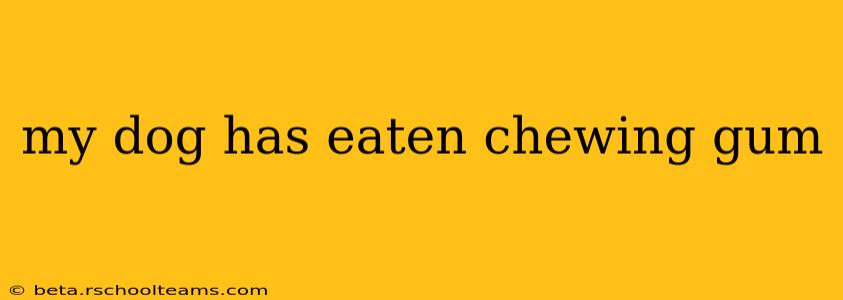Finding out your dog has eaten chewing gum can be incredibly stressful. Chewing gum, especially the sugar-free variety, contains substances that can be toxic to dogs. This comprehensive guide will walk you through the immediate steps to take, explain the potential dangers, and help you understand what to expect from veterinary care.
What's in Chewing Gum That's Harmful to Dogs?
Many chewing gums contain xylitol, an artificial sweetener that's extremely toxic to dogs. Even small amounts can cause a rapid drop in blood sugar (hypoglycemia), leading to weakness, seizures, and even liver failure. The severity of the reaction depends on several factors including the amount of xylitol ingested, your dog's size, and the type of gum.
Other ingredients, while less dangerous than xylitol, can still cause problems. These can include:
- Artificial Sweeteners (other than xylitol): While not as dangerous as xylitol, other artificial sweeteners can still cause digestive upset.
- Sugar: Excessive sugar intake can lead to pancreatitis in dogs, a serious and potentially life-threatening inflammation of the pancreas.
- Aspartame: This artificial sweetener can cause neurological problems in dogs.
Important Note: If you suspect your dog has eaten chewing gum, immediately check the gum's ingredients list. Knowing the exact contents will be crucial information for your veterinarian.
What are the Symptoms of Xylitol Poisoning in Dogs?
Symptoms of xylitol poisoning can appear quickly, sometimes within minutes of ingestion. Be vigilant and watch for these signs:
- Weakness or lethargy
- Vomiting
- Diarrhea
- Tremors or shaking
- Seizures
- Loss of coordination
- Collapse
How Much Xylitol is Dangerous for Dogs?
The amount of xylitol that's toxic varies depending on the dog's size and weight. Smaller dogs are at much greater risk than larger breeds. Even a small piece of gum containing xylitol can be dangerous for a small dog. There's no safe amount of xylitol for dogs.
My Dog Ate Chewing Gum: What Should I Do?
Act Fast! Time is critical when dealing with potential xylitol poisoning. Here's your immediate action plan:
- Identify the Gum: Check the ingredients list to determine if it contains xylitol or other potentially harmful substances. Note the amount your dog ate, if possible.
- Contact Your Veterinarian or Animal Poison Control: Don't delay. Call your vet immediately or contact the ASPCA Animal Poison Control Center (APCC) or Pet Poison Helpline. They can provide guidance based on your dog's size, the amount of gum ingested, and the ingredients.
- Don't Induce Vomiting: Unless specifically instructed by your veterinarian or a poison control center, do not attempt to induce vomiting at home. This can sometimes do more harm than good.
- Gather Information: Have the chewing gum packaging and any other relevant information ready when you contact the vet or poison control. Knowing the brand and ingredients will help them assess the risk.
- Follow Veterinary Instructions: Your veterinarian will provide specific instructions on how to proceed, which may include blood tests, medication, or hospitalization.
What Happens at the Veterinary Clinic?
Your veterinarian will conduct a thorough examination, likely including blood tests to monitor your dog's blood sugar levels and liver function. Depending on the severity of the situation, treatment may involve administering activated charcoal to absorb the toxin, intravenous fluids to stabilize blood sugar, or other supportive care.
How Can I Prevent This From Happening Again?
Prevention is key. To keep your dog safe:
- Secure Chewing Gum: Keep all chewing gum out of reach of your dog, including discarded pieces.
- Teach "Leave It": Train your dog a strong "leave it" command to prevent them from picking up dropped items.
- Be Aware of Xylitol: Read labels carefully on any products you bring into your home. Xylitol is also found in some sugar-free candies, baked goods, and toothpaste.
This information is for guidance only and should not be considered a substitute for professional veterinary advice. If you suspect your dog has ingested chewing gum, seek immediate veterinary attention. Early intervention is vital in minimizing the risk of serious complications.
